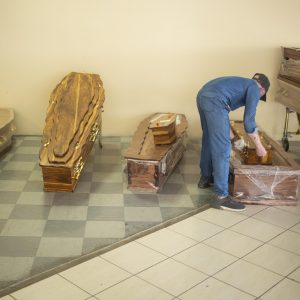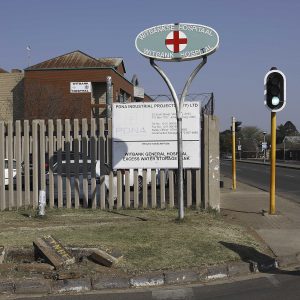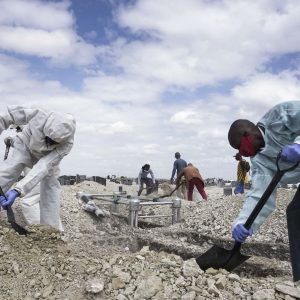Gauteng health workers struggling in second wave
Health workers and undertakers in Gauteng are now feeling the strain of the second wave of Covid-19 as the numbers of patients entering hospitals and those dying keep rising.
Author:
27 January 2021

It is Thursday night, just after 10pm. Riyaz Sayed has just taken a hot shower and now sits to enjoy his last meal of the day, a creamy chicken pasta. “My wife is a good cook,” he says. In the background, his daughter can be heard playing.
This is what Sayed looks forward to after waking up early in the morning to pick up the dead. He is a volunteer at Saaberie Chishty Youth Society, a non-profit organisation that provides ambulances and burial services to the less fortunate in Johannesburg. His workload has increased since Minister of Health Zweli Mkhize announced a second wave of Covid-19 infections.
Sayed says they attend about eight funerals each day. He is quick, however, to add that the number includes deaths due to other causes and not just from Covid-19.
Related article:
He collects bodies from hospitals around Johannesburg and takes them to a Ghusl facility in Lenasia. This is where the body is washed and later taken to the burial site. “The second wave is really much stronger,” he says.
Sayed is in a Whatsapp group with other Muslim-burial organisations. They share statistics on Covid-19 infections and deaths. “At the moment, according to the stats from the group, [there are close to] 50 deaths per day nationally,” he says.
Undertakers are essential workers too
Vuyisela Mabindisa, the spokesperson for the South African Funeral Practitioners Association, announced on 21 January that the organisation wrote to the government to prioritise funeral undertakers when South Africa obtains the first jabs of the Covid-19 vaccine. He says undertakers are essential workers too, just like health workers in hospitals. Their work, he says, puts them at a much higher risk. Funerals, for example, are known superspreader events and undertakers have no choice but to attend to them all.
“Health workers are said to be essential workers because they treat patients with Covid-19. The undertakers are equated to the healthcare workers because… we directly deal with bodies that have Covid-19. But not only the bodies, even the families that are exposed to Covid-19,” Mabindisa says during an interview on Power FM.
Related article:
Sayed says they are taking the necessary precautions while dealing with bodies. “We wear the personal protective equipment (PPE). Safety is very important. Even with the new volunteers, we train them properly,” he says.
With the second wave, Sayed says they have opted to work with experienced volunteers and not get a new group because Covid-19 is deadly and requires extensive training.
Sayed is not oblivious to the difficulties experienced by other workers in the Covid-19 struggle frontline. He recognises the trauma and fatigue suffered by workers in health facilities. “I am in hospitals every day, I see the tiredness of these nurses, the overburden on the doctors,” he says.
“With the [infection] numbers increasing, we plead to our nation: keep your mask on, sanitise and social distance.”
‘Things are bad’
James Peters*, a nurse at one of the clinics in Gauteng says that things are bad at health facilities across the province. “The second wave is stronger, and very cruel. It has shown its best fight. The first wave was mostly affecting the elders, but this one affects everyone,” he says.
The health department still fails to provide most hospital staff with proper PPE, Peters says. This contradicts the department’s claim that there is enough and proper supply of PPE in the province. “With the masks that they are providing, most of them are not of good quality. And that puts our health at [risk].”
Related article:
He says all workers at health facilities, including cleaners and security personnel, should receive proper PPE. “In order for us to fulfil our duties as nurses we need a clean environment. So if you provide PPE, you must start with a cleaner,” he says.
Peters says clinic and hospital administrators should be prioritised too. “Those are the face of our institution, when the patient comes in,” he says.
The health department decided to be selective in providing PPE, which created a huge challenge and exposed workers to the virus, says Peters. However, the responsibility also lies with healthcare workers to ensure that exposure is minimised. “Some only comply while they are at work, and don’t wear their masks properly.”
People’s attitudes count too
Peters says that the challenge also comes when educating the community about compliance and behaviour when they arrive at the clinics. “They will come in with no masks, and when you try to talk to them they say you are rude.”
He is however happy at the public’s attitude towards treatment. While the number of patients he sees has now doubled since the second wave began, people are at least knowledgeable about the virus. He says during the first wave people viewed Covid-19 as a death sentence. “Now they can see that there is this huge number of people recovering from Covid-19. They say that if I get it I will recover.”
Related article:
Current efforts by the government, including the lockdown and its regulations, are geared towards having people stay at home and move across places only when completely necessary. However, Peters has learnt from his patients at the clinic that many cannot afford to stay at home. People still have to look for jobs and feed their families.
There are, of course, those who say they are tired of the virus, and those who, having consumed conspiracy theories and misinformation about Covid-19, no longer bother to do the right thing. This does not help matters, unfortunately.
*Not his real name.




